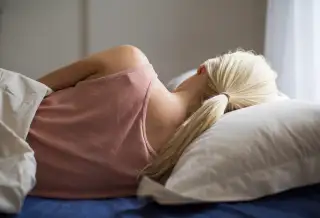Tech Experts Say These Gadgets Can Help You Get a Better Night's Sleep

Time is money — even, as it turns out, time you spend sleeping.
Researchers at the University of California, San Diego, found that getting an extra hour of shut-eye each night correlated to a 16% increase in pay. That’s quite a nice tradeoff, given that all you have to do to get it is be unconscious.
But of course, that’s easier said than done; work, schedules, stress and our ever-present mobile devices intrude on our ability to get to sleep and stay asleep. So, just in time for the National Sleep Foundation's Sleep Awareness Week, here are a few ways to help you regularly achieve the kind of deep slumber you normally only get on a long vacation.
The Sleep Shepherd Blue is a high-tech headband that monitors your sleep quality by tracking your brain waves. "It uses binaural tones to not only help you fall asleep, but with the app you can actually track your sleep in real time," says tech expert Katie Linendoll, who started working with the company after reviewing the product.
If you have trouble drifting off to sleep, the Sleep Shepherd provides some assistance by playing binaural tones that it tweaks in real time based on your brain waves. The gadget's alarm uses those same tones to lift you out of sleep gently — much easier to take than the buzz of an alarm clock. And the app gives you access to all the data it records while you’re dreaming about what you’ll do with that extra 16% in your salary.
The reason many of us don’t sleep well is because our circadian rhythms — that is, when our bodies think it’s time to sleep and to wake — don’t align with our schedules. They can also be thrown out of whack by late-night illumination in the form of artificial light, including the glow from all of our device screens. (That's why sleep experts suggest putting down the phone and turning off the TV a couple of hours before you hit the hay.) Instead of using any old lightbulbs, consider full-spectrum LED "smart bulbs," which mimic natural sunlight and prime you for sleep by filtering out the blue-tinted light that throws off your body clock.
The Helia light system takes that a step further by turning your entire home into a natural light ecosystem. The bulbs use sensors and communicate with each other over your home’s existing electrical wires, so they know when to filter out the blue-tinted light that throws off your body clock.
"It was big at the electronics show this year," Linendoll says of the Helia system. "It automatically knows in your home, with sensors, when the sun rises and when the sun sets," and emits the proper kind of light accordingly.
Finally, if just the thought of wiring your house for sleep gives you insomnia-producing anxiety, there is a lower-key way to get a nice, warm glow in your bedroom before sleep: a Himalayan salt lamp.
These soothing lamps are made by hallowing out a chunk of pinkish salt and placing a small bulb inside, so they emit a soft, warm glow. As a bonus, salt’s water-absorbing properties are said to help purify the air.
We’ve included affiliate links into this article. Click here to learn what those are.